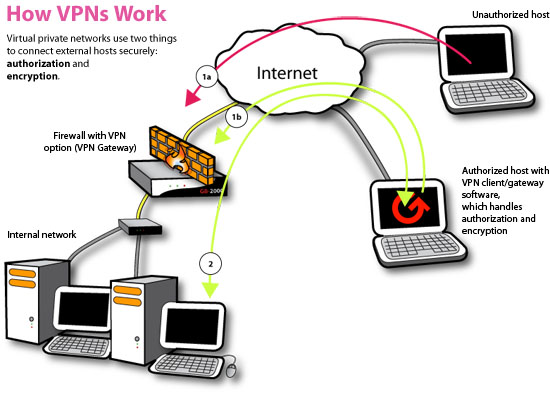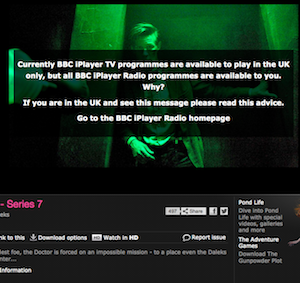Virtual Private Networks (VPNs) Fully Explained
A Virtual Private Network (VPN) service is a tool that can help internet users who wish to enjoy greater privacy and improved security while they surf the net. There are VPN software packages which run on single platforms like Windows, Mac, Linux, iOS or Android, and other VPN services with deeper pockets who have paid for the development of apps across several platforms using a single VPN account.
How Virtual Private Networks Actually Work
The way a VPN service works is that it takes all internet communication, scrambles it with strong encryption (usually 256-bit or greater) and then sends that encrypted traffic over the internet to their VPN server. Typically the internet service provider (ISP) in the home country of the user will not be able to know exactly how they are using the internet because they are tunneling through the internet with encrypted traffic rather than browsing the web normally.
Once reaching the VPN server usually in another country the encryption is removed and the web traffic is sent normally over the internet decrypted from that point (except for secure web site browsing on web sites using the HTTPS protocol which uses their own SSL encryption when visiting their site).
Essentially, internet use is encrypted so internet cafes, local authorities and ISPs cannot see what web sites are being visited, what email is being sent or received, files being downloads, and the instant messaging (think: China monitoring its citizens' Skype messaging which has been going on since 2008).
The user picks what VPN server to use in their chosen country. This is where their encrypted internet traffic is sent to and then decrypted on the server in that country, and only then is sent over the internet normally. Therefore, a user can be using the internet in China with a VPN service and access web sites that are usually blocked by China's national firewall.
VPN Communication Protocols
There are several different types of VPN communication protocols with names like OpenVPN, PPTP, and L2TP. We don't go into the specifics of these here but suffice to say that a provider that offers more than one protocol type is preferred.
Getting Around Media Restrictions
An expat in Malaysia can view BBC media playing on the BBC iPlayer media player when connected to a VPN server in the UK because it will appear to the BBC server that they are actually accessing the iPlayer from the UK. In Malaysia the content would be blocked.
Protect Login Information and Sensitive Data
The use of an effective VPN service can help to protect people using insecure wireless networks. Using a shared wireless network in a hotel, guesthouse, hostel, internet café or regular café can place the user at risk from other visitors who can scan the wireless network using software tools to view data packets being sent across the network by multiple users.
Many people prefer to use a VPN app on a mobile device when connecting to wireless 3G or 4G LTE services because their information is no longer going over fiber optic cables but wirelessly being broadcast through the air.
Web site access, file downloads and the use of peer-to-peer networks can also have its origin altered to protect the user from unnecessary intrusion of their online activities by hiding their originating IP address.
Watch For Companies That Don't Allow Access Via VPN
Be aware that some companies like PayPal and certain banks look for customers accessing their services through a VPN and will go so far as to freeze or ban their account as a result. Such companies are concerned about who the VPN provider is and whether access to their services through their VPN server is safe. As they cannot determine whether it is safe, they ban their use. So it is best to check with the companies used before connecting to a VPN service to avoid future problems.
Changing VPN Servers Frequently
With some VPN providers it is possible to simply disconnect from a VPN server in one country and connect to one in another location. With other providers they set a limit on how many different countries may connected to at least once per month and have different accounts depending on the number of countries changes needed in a given month.
How Many Countries Is Enough
Depending on the VPN service provider, the number of countries and which ones that are included in their VPN server list will be different. Some providers include Asian servers, others do not. Most will include the USA, the UK, and a few other European destinations, but probably not list any servers in Latin or South America, or Africa. It pays to shop around for the countries you would like to be able to connect to using a VPN service.
Does The VPN Provider Log User Activities
Depending on the VPN provider, the location of the VPN server and the laws in the respective country (both location of the business & VPN server location), it may be necessary legally for VPN providers to keep detailed logs of user activities. This can be anything from connected IP addresses which give away their true location to logs of what web sites were visited, chats, and files downloaded, etc. Checking VPN provider web sites for more information can help with this.
For people who wish to download torrents
Some VPNs do not allow access to file sharing sites or torrent downloads, so for anyone interesting in using those services while connected to a VPN it is important to verify whether the VPN provider accepts this type of download activity. Companies like VyprVPN have been known to terminate a user account where torrents are being downloaded.
Will The Speed Be Slower
The speed of the internet use usually depends mostly on your local ISP. When connected to a VPN, the speed of the internet will also depend on how fast the connection is from the VPN server out to the internet. If the VPN provider is underfunding the internet backbone connections to save money then the service may be quite slow compared to when not connected to the VPN service.
The speed of the VPN line will also depend on how far away the VPN server is from your current location. For instance, to connect to a UK VPN server from Asia, the traffic is run through either Japan or Singapore, then along the ocean floor to the USA, then hops over to the UK, all of which will slow down traffic far more than simply connecting to a nearer Japanese VPN server which is offered by the likes of TunnelBear.
The user has to consider which countries and jurisdictions they will accept as a location for the VPN server they will use because their internet traffic will be decrypted in that country and be subject to the applicable laws in the country they select.
Ultimately, there will certainly be a speed impact especially for those with high-speed connections, when connecting to a VPN service. For people who are using 3G mobile connections, depending on the speed of the cellular connection, it may not be fast enough to support a connection to a VPN service which will slow their internet connection down prohibitively.
Free Versus Paid VPN Services
There are reputable free VPN services and then there are others where one has to consider what they need to use the VPN service for.
A good rule of thumb is that a VPN provider that offers free accounts also has paid accounts for consumers or business users. This is because they still need to make money from providing the service and without a good revenue stream from paying customers they may be tempted to sell usage logs to marketing research firms and cut other corners on server hardware and internet connections which will affect the quality of the service received.
Some providers do offer free accounts, like TunnelBear who have a 500 MB allowance of free monthly encrypted traffic, so these are worth considering as well. When hitting the monthly limit the customer then has the option whether to upgrade to a paid account with a high bandwidth limit or an unlimited bandwidth account depending on what the provider offers.
VPNs Are Not Anonymous Proxies
VPNs and anonymous proxies are often confused. Anonymous proxies are similar to VPNs. They are either direct connections that can be added to web browsers to change how they surf the internet or can be accessed via live web sites. Only in some cases can an anonymous proxy be used in such a way that all internet communication runs through the proxy.
In the case of the live web sites, an internet user would visit a site like KProxy.com, enter the web site they wish to visit anonymously into the address box inside the KProxy page, and their internet surfing will be less tracked by their ISP.
With proxy servers the focus is on being able to use a different IP address for online activities rather than specifically being able to connect to the internet via a VPN server in a different country. VPNs are better when needing to appear to be surfing from a different location due to geo-location restrictions on visitors or users.
Free proxies can be handy just to look up a web page that you wish to see without it showing up in your web browser history (or which are blocked locally) however it is not generally safe to log into any websites using username and password authentication because this information may be being recorded, or even sold, by the free anonymous proxy provider.
Paid proxies are often used by internet marketers who need to access services that restrict how many times the same IP address can run searches. With a paid proxy they can have access to several different IP addresses of multiple proxies in order to run searches without being blocked.
Recommended Virtual Private Networks
See our list of recommended virtual private networks to use for protected internet use and to get around restrictions on web site access.
Make Your Own VPN
We have a guide on How To Make Your Own Free Personal VPN For Total Anonymity.




